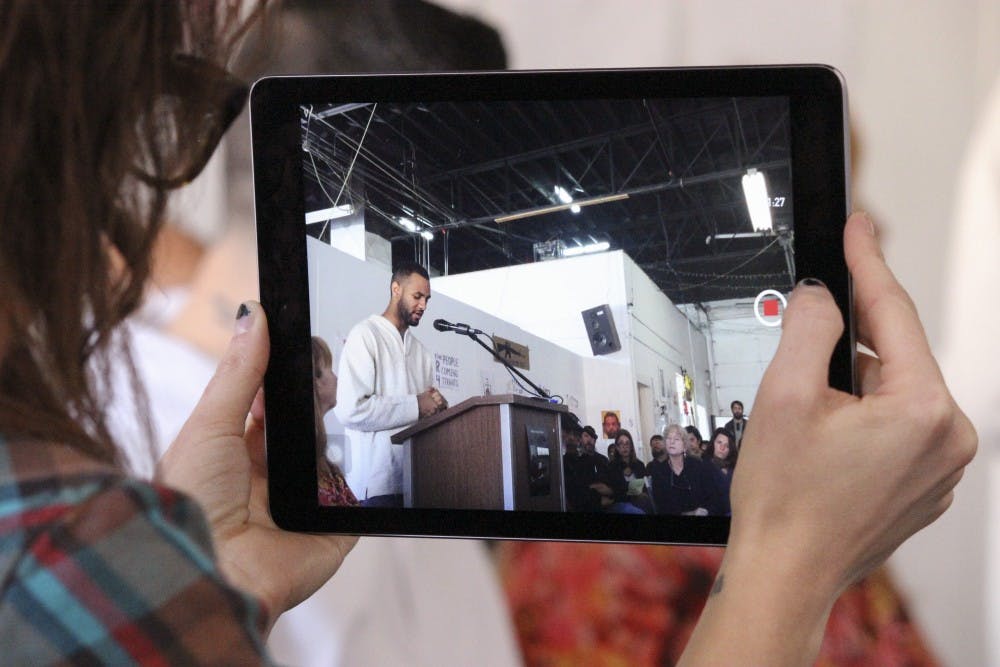Activist group ABQJustice, with help from other community groups, held the Albuquerque People’s Tribunal on Police Brutality on Saturday. The event, which was open to the public, featured the results of a six-month-long, street-level investigation of “prejudice and racial bias” in the APD.
American Studies professor and ABQJustice member David Correia helped compile the investigation and presented the group’s findings at the tribunal.
“I thought it was good,” Correia said. “There’s really two pieces: there’s this report, which we’ve spent six months doing, with dozens and dozens of interviews with people on the street; then, this tribunal is an opportunity to make a preliminary presentation of our findings, trying to ask these panelists to help us figure out what we really need to do to resolve these problems that we’ve identified.”
According to the preliminary report, the group decided to conduct its own investigation after the U.S. Department of Justice’s report was released.
The group complained that the DOJ’s investigation only looked at a two-year period of police violence, and did not address racial biases and other systemic prejudice in the police force.
“ABQJustice, along with social justice and civil rights organizations in Albuquerque, note the DOJ’s failure to investigate racial bias and prejudice at APD,” the report states. “This failure has produced an agreement that does not provide solutions for racially motivated use of force issues at APD.”
The investigation consisted of more than a dozen ABQJustice members interviewing 41 people in four neighborhoods around Albuquerque, one of them UNM’s Main campus. The interviews included stories of violence and prejudice against minorities, women, homeless people and people with mental illnesses, according to the report.
Many of these stories were read as testimonials during the tribunal.
The report also included a comprehensive history of civil rights violations by APD going back decades. Los Jardines Institute member Richard Moore, who has been an outspoken activist against APD violence for close to 50 years, presented this historical overview to the tribunal.
“The militarization of APD and the police forces have a long history. It’s not been recent over the last four or five years,” Moore said. “There’s some real historical pieces there that go along with this — brutality, harassment — that needs to be added to this whole story to make it a complete picture. In order to understand where we’re going, we ought to understand where we’re coming from.”
Moore said he felt the tribunal was an important step in the ongoing struggle for justice.
Get content from The Daily Lobo delivered to your inbox
“Today was not the beginning, it’s not the end, but it’s a continuation of what needs to be done,” he said.
Other expert witnesses discussed specific topics such as violence against the homeless population, people of color, people with mental illness, and former APD officer Sam Costales discussed systemic problems with APD’s training.
Correia said the ultimate goal is to build a large group of supporters, and then bring a more refined report to local government agencies.
“The city administration — Mayor Berry, City Administrator Rob Perry — have demonstrated no interest whatsoever in this issue,” he said. “They’re ultimately responsible because they can hire and fire the police chief.”
However, he said he felt they would have much better luck presenting their report and suggestions to City Council and to the newly-created civilian Police Oversight Board.
Correia said he had recently shared some of ABQJustice’s recommendations to Congresswoman Michelle Lujan Grisham, who reacted very positively to the group’s ideas.
“I’m hoping that we come up with some really tough expectations that we find a good reaction to,” Correia said.
Jonathan Baca is the news editor at the Daily Lobo. He can be contacted at news@dailylobo.com or on Twitter @JonGabrielB.






